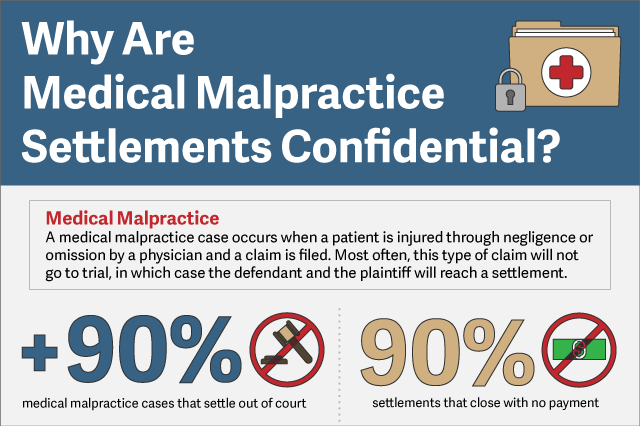
A medical malpractice case occurs when a patient is injured through negligence or omission by a doctor or other healthcare provider and a claim is filed by the patient or their family. Most often, this type of lawsuit will not go to trial, in which case the plaintiff and the defendant will reach a settlement. In fact, ninety percent of medical malpractice cases will settle out of court. Medical malpractice settlement agreements will typically include a confidentiality clause in order to keep both parties and their counsels from sharing the outcome of the settlement.
Why Plaintiffs Want Confidentiality
- Without a confidentiality clause, mediations can get drawn out for longer than they would with an agreement in place.
- Longer mediation periods or jury trials can be costly.
- Plaintiffs may want the details of their case to remain private for personal reasons.
Why Defendants Want Confidentiality
- Confidential settlements may prevent others from being encouraged to file medical malpractice claims when they see that large damages amounts were awarded.
- Settlement amounts will not be able to be used in future settlement negotiations for medical negligence cases.
- Doctors do not want to be viewed as a target for medical malpractice claims.
- Defendants may want the details of their case to remain private for personal reasons.
What Are the Pros of Confidential Settlements?
In most medical malpractice cases, the defendant and their insurance company will seek a confidentiality clause. Doctors who are defendants in medical negligence claims want confidentiality so that the plaintiff cannot share with the public that they paid a substantial amount to settle the case. Ultimately, defendants do not want to be viewed as a target for future medical malpractice claims. Insurance providers prefer confidentiality because it prevents the public from knowing how much was paid out for certain injuries and using those amounts as leverage in future cases.
Aside from financial purposes, plaintiffs or defendants may just want the facts of their case to remain private for variety of different reasons.
What Are the Cons of Confidential Settlements?
Plaintiffs who suffer from medical negligence damages will often pursue a claim stating that they want to prevent the criminal act from happening to anyone else. When there is a confidentiality clause set in place, the public will not know the award amounts and will not be able to make assumptions regarding future cases.
Most medical malpractice lawyers representing plaintiffs do not want a confidentiality clause because it prevents them from sharing settlement information to reference on future cases.
Let a Medical Malpractice Attorney Guide You Through Your Claim
Negotiated settlements for claims associated with medical malpractice will often involve the issue of confidentiality. Whether you are a plaintiff or a defendant in a medical malpractice case, confidentiality of settlement amounts should be discussed before settling the lawsuit. Contact a medical malpractice attorney at Miller & Wagner today to find out more about confidentiality clauses and what the pros, cons, and risks are for your case. Our experienced attorneys will help you make an informed decision before pursuing your claim.